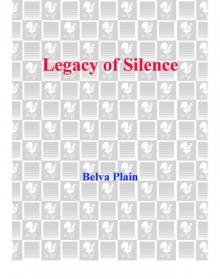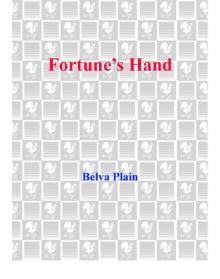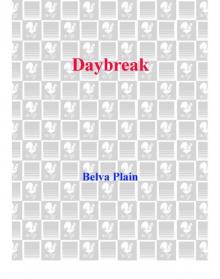- Home
- Belva Plain
Tapestry Page 6
Tapestry Read online
Page 6
He let himself into the apartment and went down the hall to their bedroom. She was sitting in front of her dressing table; she had a hairbrush in her hand, but it lay on her lap and her head was bowed; he caught a glimpse of her doleful face in the mirror before, hearing him come in, she straightened and began to brush her hair.
He said suddenly, without having planned to say it, “Mimi, I ask you again: Why don’t we adopt?”
She looked at him through the mirror. “And I tell you again: No. If I can’t have my own, I don’t want any substitutes. I suppose I’m just one of those people born to have nothing, not supposed to have anything in this life. Nothing. I have nothing.”
He saw that she was not aware of her words’ recklessness, nor of their irony. The room was warm; the perfume with which she sprayed herself before going to bed still hung in the air; the white satin quilt was turned down and a little pile of books lay on the bedside table. She had not yet hung up her sable-trimmed suit, which lay on the chaise longue.
Yet these were only possessions and comforts; was it not to her credit, when you thought about it, that they weren’t enough to assuage her pain? Any more than they were able to assuage his own?
And because he needed suddenly to hide his face, he opened the closet door and pretended to search for something. If Mimi knew what he knew and had anguished over all this past year, ever since that unforgettable, blustery spring afternoon when he had at last met Anna again and learned … what he had learned!
He had a child! He had a little girl!
It was unreal, and yet it was true. She had been born of their one and only union; her name was Iris; she was a pair of huge eyes in a blurred photograph. And that was all, and that was all she ever would be, or ever could be.… His daughter. His. Brought up and nurtured by another man, by the innocent husband … because it had to be that way … because he had promised never, never to try to see either Anna or the child.
To wreck her marriage, after what she had already suffered, was not to be thought of. And yet sometimes his longing was unbearable.
He collected himself. “You going to bed now, Mimi?”
“Yes, I’m tired.” Then swiftly, the familiar look of anxiety crossed her face, as if she were controlling tears. “Paul, I shouldn’t have said what I did about having nothing. I didn’t mean it the way it must have sounded.”
He saw how real her distress was, and answered kindly, “I know you didn’t. I knew it while you were saying it.”
“I know I have an awful lot to be thankful for. I have you, and this home and—and everything.”
“You were feeling blue, that’s all it was.”
“Yes, blue. And bitter, which isn’t anything to be proud of. But I just cannot help it sometimes.”
He patted her shoulder. “Forget it. You’ve a right to a mood. Get some sleep and it will be all gone by morning.”
“Are you going to sleep too?”
“I’m not quite ready yet. I think I’ll go fiddle with the radio for a while.”
The Freed-Eiseman, his latest toy, was in the library. Having adjusted the earphones, he waited for the miracle. It came: the far-distant, slightly tinny sound of music, a jazz band. For a while he listened and marveled again, trying to comprehend the wonder of sound that was able to fly into his room from the outer air. Dan had once tried to explain it to him, but it was still not clear; Paul’s was not a scientific mind.
Then, swiftly, he grew tired of listening. It occurred to him that he was too often and too swiftly tired of whatever he was doing, except when he was working at the office. Here at home, he, who had once been able to read for hours, immersing himself, grew restless after half an hour and had to get up and walk about or look aimlessly out of the window. It’s Mimi, he thought. Marian and I. Then it struck him that, very often now, he thought of his wife as “Marian” rather than “Mimi,” a name that seemed to come from another time, the time of her girlhood, and from a different personality. Marian-Mimi-Marian. Confusing.
And remembering “Mimi,” he thought: She was so trusting. She is still. She trusts me, depends upon me. His thoughts about her and his resentment made him feel guilty.
But things kept cropping up, small things. Her voice when complaining, and she complained often about services. The cook just never learned to make proper toast; the delivery that had been promised for two o’clock didn’t come until half past. Her voice had developed a whine.
No doubt, though, he had habits that must irritate her. He knew, for instance, that she couldn’t stand the noise he made when he bit into an apple. He had seen her glance at him and tighten her lips to keep from saying something.
Still, these annoyances must be quite normal, mustn’t they? Probably most couples, maybe all couples, developed such differences in the course of their years.
If only those were the sole differences between him and Marian! Then: Hold on, Paul, hold on. She’s a good woman, a good wife. Compliant. Willing. Even in bed, he thought wryly. Obedient, although she didn’t like it. She would never admit that she didn’t. He had asked her once and she had flushed, replying, “Why, of course! Of course I do, Paul. What a question!”
A stupid question, and stupid of him to have asked, when he already knew the answer, when it was so plain.
And when he reflected upon the attentions that she could still bestow, waiting on him, catering to his wants until he felt stifled, he wished, and then was ashamed of the wish, that she would not love him so much. All that devotion! It passed for love, but was it love? Love without passion? But perhaps that was the most unselfish kind? Or was there a contradiction? Could she unconsciously sense his true feelings? Did he rebuff her in any way? He didn’t mean to. Would she—could she—be different with some other man, passionate as he would be if he could have Anna?
He thought not.
Unanswerable questions nagged him, and he sat dully. Tired. He was so tired.
He had been thinking off and on for the last few months about Europe. He hadn’t seen the real Europe—the time in the trenches didn’t count—since that summer of 1912 when he had gone over with poor Freddy and shown him all the old splendid places, and met their cousin Joachim, fourth cousin or third cousin once removed or something like that, and talked about their ancestors. Such a German he’d been! And yet they had liked each other, and it would be good to see him again. He’d been wounded in the war, but he was well now, he wrote, and married; he’d sent a photo of his pretty wife with their little girl.
Yes, it would be interesting, it would be good to see him.
Then he thought of the ship. To be on a ship again! To hear once more the long deep blast of the horn as we move downriver, out through the Ambrose Channel, past the Light, and into the open, rolling, vacant sea.…
Suddenly he knew he had to go, had to get away.
Marian was reading in bed.
“How would you like to go to Europe?” he asked, being fairly sure that she would not.
She put the book down. “What? Why now?”
“I really should see some people who used to do a lot of investing with us before the war. Pick up the pieces.”
“Can’t it wait? I’d be miserably seasick on the North Atlantic this time of year.”
“I really should. With this inflation in Germany, everything’s unsettled, and we’ve some loans outstanding there. In London, too. Father thinks I should go.”
His father hadn’t mentioned it, but most certainly he would approve, would even be enthusiastic. The more Paul thought about it as the seconds passed, the more important it actually seemed for him to tend to business abroad.
“How long will you need to be gone?”
“Well, a week each way for the voyage and other travel, with probably two, maybe three weeks over there.”
“Oh, dear! We’d be coming back in November and it’s so horribly cold.”
Paul waited.
Marian’s wrinkled forehead looked plaintive. Then she said, “Oh,
Paul, would it be too awful if I let you go alone? Do you really have to go just now?” she repeated.
And he repeated, “Clients. Business.”
“Well … I could go down to Aunt Flora’s new place in Florida.”
“You really have been wanting to see it, haven’t you?”
“I had thought we might go together this winter.”
He had no love for Florida, especially for Palm Beach, where he felt unwelcome in spite of all the denials on the part of Marian’s family and friends, who had abandoned Miami as being “too Jewish.” It was pleasant, he admitted, to wake up after an overnight trip and find the train stopped among palms washed in sunlight. But the life there bored him, the golf and cocktails and dinner, golf and cocktails and dinner again, with bridge thrown in, one day after the other.
“We’ll go together another time,” he promised.
“I do feel so guilty,” she sighed, with a pleading look. “Poor Paul, with a silly wife who gets seasick and can’t stand the cold, so that he has to go all alone. Oh, I do feel guilty.”
“Guilty? Of course not!” he said soothingly.
“I’m sorry I said that before about having nothing. It’s not true, of course. I have so much … I have you. It’s just that I feel discouraged sometimes, wondering how you must feel about a wife who can’t give you a child, when you want one so badly.”
Her tone, beseeching, called forth his answer. “You mustn’t talk like that.” He patted her cheek. “You have me, I have you, and we’re here together. Let’s not go feeling sorry for ourselves. Agreed?”
She gave him an obedient smile.
“There, that’s better! That’s more like you, Mimi. Tell you what, you just go on down to Aunt Flora’s, have a good time in the sun, and I’ll be home before you know it.” He bent and kissed her.
Later in bed, when Marian was already asleep, he lay thinking that, in a way, it would be a lonesome voyage. One ought to have a companion on shipboard, walking the deck, breathing the pure air, and eating the marvelous food together. Even Hennie would have been a companion of some sort. She’d been wanting to go to Europe to a meeting of the Women’s International League for Peace and Freedom, but Dan’s health was too precarious for her to leave him. So he would just walk the deck alone.
Yet, the way things were, maybe some time alone would do him good.
Three
“At last I meet the American cousin,” said Joachim’s wife, Elisabeth.
Regarding him frankly from across the table, she sat with her chin in her hands, a somewhat plump young woman, with an upswept mass of very blond hair fastened in a topknot. Her round, lively face made the word adorable come to Paul’s mind, although it was a sentimental word that he seldom used.
He had arrived in Munich at midafternoon to find coffee and a spread of yeast cakes waiting for him in the alcove at the end of the dark Gothic dining room. Now, only a few hours later, they were back in that room, this time at one end of the long main table, eating an enormous dinner: vegetable soup with dumplings, potatoes, red cabbage, Sauerbraten, fruit conserve, turnips, pickles, homemade bread, wine, and a black cherry pudding. Solid, heavy nourishment. Germans, Paul remembered having thought before, are always eating.
“Too bad you didn’t bring your wife,” Elisabeth remarked.
“Well, except for visiting you, this has been a business trip. It was a rough voyage and London was all foggy,” he said lightly, adding, “Marian isn’t well, she has sinus trouble. I couldn’t postpone the trip,” he repeated, “so many threads to pick up that the war tore out.” He was making unnecessary explanations, and stopped.
Joachim sighed. “The war tore out a lot of threads.”
“To think that you two fought each other,” Elisabeth exclaimed. “It’s crazy, all of it! Did you know that Joachim got the Iron Cross? He captured ten Frenchmen. Ten poor souls like himself.”
Joachim reprimanded gently, “Let’s not talk about it. Paul and I got through the war talk in our first ten minutes, riding here from the station. Now let’s just talk of good things.”
“Of course,” Elisabeth agreed.
Paul observed, “This is a beautiful apartment.”
He had known what to expect the moment they had driven past the wrought-iron gates into the courtyard, having been in many buildings like this one in Rome and Paris and all over the Continent. You entered the public hall, floored with marble, and on a red carpet mounted the central staircase to the private apartments. This one had fourteen rooms.
From where Paul was sitting, he could see past velvet portieres into a room filled with French Empire furniture; the drawing room fireplace was faced with Delft tile; through the opposite doors he could see the conservatory, in which settees and little tables stood among palms and frothing ferns. Above his head a cascade of crystal icicles hung from the chandelier, which brightened a table long enough, Paul estimated, to seat twenty-four.
“The apartment belongs to my parents-in-law,” Joachim said. “They’ve moved to the country. At my age I certainly couldn’t afford anything like this.”
“My father and my uncle Cohen own three department stores, but they have real estate, too,” Elisabeth explained.
“Excuse me, Elisabeth, but then you are Jewish?” Paul asked her.
Joachim laughed. “What did you think? I know you are thinking she doesn’t look Jewish,’ whatever that means.”
“Whatever that means,” Paul repeated.
It was true. How many “real” Germans were as blond as they liked to imagine themselves? If you knew anything about Europe’s history, you knew it was age-old wandering; Romans in England left from their seed dark eyes and arched noses; Teutons in Italy left a legacy of blue eyes; Vikings left their red hair everywhere from Poland to France. And as to the Jews, two thousand years out of Jerusalem, how many copulations, willing and mostly unwilling, had produced their variety?
His mind, as he ate the pudding, began to wander. Traveling, as well as the hours-long effort to speak German for the sake of Elisabeth, who knew no English, had tired him. He was suddenly aware that Joachim was telling him something.
“If we can manage to hold on to the properties, we’ll survive the inflation. It can’t go on forever, it simply can’t.”
Paul was jolted awake. This dinner—what it must have cost them! While he had been eating with good appetite, they had been skimping; they had taken barely a spoonful of pudding on either of their plates. He felt embarrassed, ashamed of his own thoughtlessness, and quickly declined when the maid offered a second helping. Thoughtless. He had read in the newspaper, on the train, that a single restaurant dinner now cost almost two million marks. Yes, the table was set with fine cutwork linen and the chairs were upholstered satin, printed in Napoleon’s gold bees, but you couldn’t eat the linen or the satin.
Joachim inquired whether he was cold. “We are somewhat short of coal,” he said, cheerfully enough. “We try to put the heat up for you. People say that Americans live in hothouses.”
“Oh, not for me, please,” Paul protested.
“I can get you a shawl. In the evening the heat goes down. We men are not ashamed to sit with a woolen shawl over our jackets.”
“I’m fine, I’m fine,” Paul insisted.
“Well, we Germans have lived through worse than a little cold,” Joachim said. “What we have lived through! And we will survive. We always do.”
Paul felt that he was expected to respond to this optimism. “Yes, with patience,” he said. It was a banal remark. And he added, “This war will go down in history written large as the fall of Rome. What folly! But then, all war is folly.”
“And the folly of the peace.” Joachim’s tone was surprisingly sharp. Quite suddenly it altered the jovial atmosphere. He leaned toward Paul. “Your president, with his Fourteen Points. He promised we would not be dismembered or punished. He promised justice. And what happened when we came to Versailles? There was no justice. We lost our colonies, we lost S
ilesia, we were dismembered. The Armistice was a swindle!” He rapped the plate with his spoon. “But you will be sorry, all of you Allies, when the Russian bear comes to full power! It will be the strongest on earth. Murderers! Look what they did to their royal family! And only Churchill, among all of your leaders, has sense enough to see what they are. It’s they whom you should ruin, not us Germans!”
Elisabeth met Paul’s glance. He saw that she was embarrassed.
“He gets so emotional, my poor man. I tell him, what’s the use? What’s done is done. Save your breath.”
“We are a great and civilized nation,” Joachim said, as if he had not heard. “And say what you will, the treaty that has been imposed upon us is a swindle. It is not what we were promised!”
It was true that even his own secretary of state had said that Wilson had betrayed his principles, Paul reflected. He himself had felt some of Joachim’s doubt; the demand for reparations was ruinous. But hearing these things from this—this German was another thing.
“Our economy is being strangled,” Joachim went on, breathing heavily and staring reproachfully at his empty plate.
Quietly, Paul answered, “With a balanced budget, this suffering could have been avoided. But your right-wing industrialists wouldn’t let the government raise taxes; they’re getting rich on the ruin of the mark.”
Joachim raised his face. It looked wounded. “Excuse me, but that sounds like nonsense.”

 The Golden Cup
The Golden Cup Her Father's House
Her Father's House Whispers
Whispers Crescent City
Crescent City Legacy of Silence
Legacy of Silence Crossroads
Crossroads Promises
Promises After the Fire
After the Fire Tapestry
Tapestry Looking Back
Looking Back Heartwood
Heartwood The Carousel
The Carousel Fortune's Hand
Fortune's Hand Homecoming
Homecoming Random Winds
Random Winds Harvest
Harvest Evergreen
Evergreen Treasures
Treasures The Sight of the Stars
The Sight of the Stars Secrecy
Secrecy Daybreak
Daybreak Eden Burning
Eden Burning